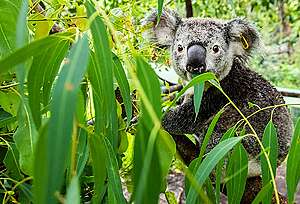What do a homeless koala, a Big Mac and a banner drop have in common?
A hidden deforestation crisis
You may be surprised to learn that Australia has one of the worst rates of deforestation in the world, alongside places like the Amazon Basin and The Congo1. What’s causing it? Australians’ insatiable appetite for meat — one of the highest of any country2 — means that vast tracts of forests and bushland are being bulldozed every year for beef cattle grazing, fuelling the biodiversity and climate crisis.
In fact, independent research commissioned by Greenpeace Australia Pacific found that a staggering 668,665 hectares of threatened koala habitat was bulldozed for beef production in the last five years alone — that’s 2,400 times the size of Sydney city.
Right now, the beef industry in Australia is killing millions of native animals every year3, including koalas, wallabies, lizards and birds, and McDonald’s is one of Australia’s biggest beef purchasers4.
Why McDonald’s?
McDonald’s is reportedly the world’s single largest purchaser of beef and one of the biggest buyers of Australian beef, which supplies a mind-boggling 65% of McDonald’s stores globally, according to a company spokesperson.
Unwitting McDonald’s customers would be shocked to learn that their Big Mac could have been sourced from threatened koala habitat that was bulldozed for beef production.
Despite the glossy marketing campaigns, McDonald’s can not say for certain that its beef has not come from deforested properties. Given deforestation has been a persistent issue in Australian beef supply chains for decades, this seriously calls into question any claims towards being virtually deforestation-free.
Major global markets like the European Union are already introducing legislation to block products linked to deforestation — leaving McDonald’s in a bit of a pickle.
Time to take deforestation off the menu
We’re all sick of the PR spin and greenwashing from large corporations seeking to exploit nature for profit.
Greenpeace Australia Pacific is calling on McDonald’s to publicly aim for, and achieve, conversion and deforestation-free supply chains by 2025, using global best practice definitions, which includes protecting important regenerated forest and threatened species habitat.
For too long the beef industry has hidden behind watered-down definitions and weak nature laws. If big corporations like McDonald’s take real action to change their practices, we can stop the destruction of native wildlife and the places they call home.
It’s time McDonald’s takes deforestation off the menu and supersizes its commitment to eliminating deforestation from its supply chain.
Greenpeace Australia Pacific has launched its ‘Take Deforestation off the Menu’ campaign, accusing McDonald’s — reportedly one of Australia’s biggest beef purchasers5 — of driving deforestation and nature destruction, and pushing iconic Australian species like the koala to the brink of extinction.
For more information and to sign the petition, visit: act.gp/mcdonald’s
- https://wwf.panda.org/discover/our_focus/forests_practice/deforestation_fronts_
- https://www.mla.com.au/prices-markets/Trends-analysis/state-of-the-industry-reports/#:~:text=Australia%27s%20per%20capita%20beef%20and,global%20average%20is%206.3kg
- https://www.greenpeace.org.au/greenpeace-reports/beef-industry-impact-on-australian-forests/
- https://www.beefcentral.com/news/mcdonalds-says-its-australian-beef-is-deforestation-free/
- https://www.beefcentral.com/news/mcdonalds-says-its-australian-beef-is-deforestation-free/

